The Rise of AI Agents in Healthcare: A Comprehensive Guide
AI agents are transforming the way businesses operate, offering tools that streamline tasks, improve customer interactions, and drive growth. In 2025, these digital agents are more advanced, capable of performing complex tasks across industries from automating routine support inquiries to assisting in data analysis and personalized marketing. This guide dives into how AI agents are reshaping the business landscape, the top trends to watch, and the strategies companies can adopt to harness these tools effectively.

Whether you’re a small business looking to optimize operations or a large corporation aiming for a competitive edge, understanding AI agents is essential. We’ll cover the types of AI agents, their key benefits, and real-world applications to help you implement the right AI strategy tailored to your business needs.
Table of ContentUnderstanding AI AgentWhat is AI Agent for Businesses?
How Do They Work?
Benefits of AI Agents for Businesses
How to Get Started with AI Agents in Your Business?
How to Choose the Right AI Agent for Your Business?
Key Trends in AI Agents for 2025
Key Applications of AI Agents Across Industries
10 Tips on ROIs After AI Agent Integration
Challenges and Limitations of AI Agents
ConclusionUnderstanding AI Agent
An AI agent is a software program designed to perform specific tasks, learn from data, and make decisions based on that learning, all while interacting with its environment. Unlike traditional software, AI agents are adaptive, meaning they can improve over time by processing new information and adjusting their behavior accordingly. These agents range from simple automated tools, like chatbots that answer customer inquiries, to advanced systems that analyze vast datasets, predict trends, and even recommend actions. AI agent development operates across various domains, including customer service, data analytics, marketing, and operations, providing businesses with flexible, intelligent support.
By automating repetitive tasks and enhancing decision-making, they allow businesses to optimize efficiency, reduce costs, and deliver better customer experiences. As AI technology continues to advance, AI agents are becoming more accessible and customizable, making them an invaluable resource for companies looking to stay competitive and innovative in today’s fast-paced market. Understanding AI agents is key to leveraging their potential for growth and innovation.
What is AI Agent for Businesses?An AI agent for businesses is a digital assistant powered by artificial intelligence that performs tasks, learns from interactions, and makes decisions to support business operations. Unlike standard software, AI agents are adaptive, meaning they learn from data and adjust their responses or actions based on real-time information. Businesses use AI agents across many functions, including customer support, sales, data analysis, and marketing.
For example, in customer service, AI agents handle common inquiries, freeing human staff for more complex issues, while in sales and marketing, they analyze data to provide personalized recommendations and targeted campaigns. These agents can also automate routine tasks, identify patterns, and predict trends, enabling businesses to make faster, data-driven decisions.
As AI technology evolves, these agents become more sophisticated, customizable, and capable of understanding complex business needs, making them indispensable tools for improving efficiency, customer experience, and scalability. AI agents allow businesses to operate more intelligently, ultimately helping them remain competitive in an increasingly digital world.
How Do They Work?AI agents for businesses in 2025 operate as autonomous software programs designed to carry out specific tasks, make decisions, and adapt to new information in real time. Here’s a closer look at how they work and what makes them essential:
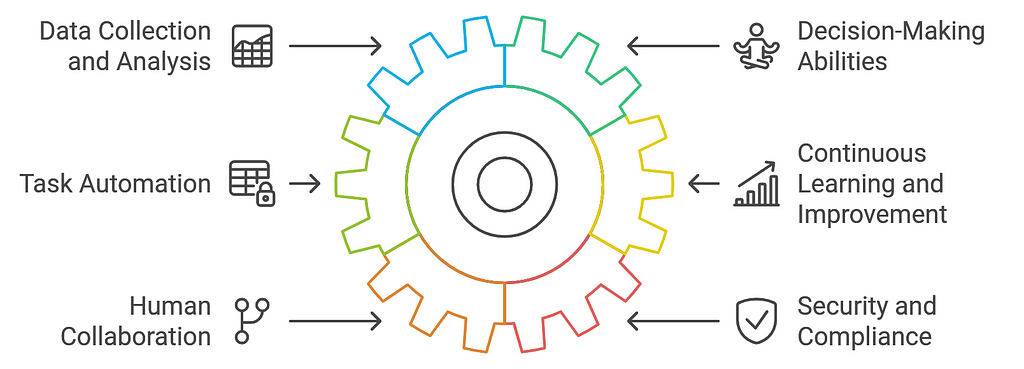 1. Data Collection and Analysis
1. Data Collection and Analysis- Data Sources: AI agents pull data from various sources CRM systems, sales reports, social media, customer feedback, and even IoT devices.
- Data Processing: They analyze this data using algorithms like natural language processing (NLP), image recognition, and pattern detection to make sense of structured and unstructured information.
- Machine Learning Models: Machine learning enables these agents to make informed decisions by recognizing trends and correlations. Models are trained on historical data to predict outcomes, recommend actions, and adjust strategies.
- Contextual Understanding: Advanced agents also use contextual data, such as the time of day, location, or previous interactions, to make more relevant decisions, enhancing customer interactions and operational efficiency.
- Routine Task Management: AI agents automate repetitive tasks, such as handling customer inquiries, scheduling, inventory management, or basic data entry, freeing up employees for higher-level work.
- Complex Workflows: For more complex tasks, like procurement or financial forecasting, agents streamline workflows by connecting different systems and coordinating actions automatically.
- Reinforcement Learning: Some agents learn continuously through reinforcement learning. They optimize performance by trying various approaches and receiving feedback on what works best.
- Adaptive Algorithms: AI agents adapt as new data comes in, improving their responses and actions over time. This makes them more effective as they evolve alongside the business environment.
- Augmented Decision-Making: Rather than replacing humans, many AI agents are designed to support human decision-making. For instance, a sales agent may provide a team with customer insights, enabling more personalized interactions.
- Seamless Integration: AI agents are often integrated with platforms like Slack, Microsoft Teams, or CRMs, allowing teams to interact with them seamlessly for real-time information.
- Data Security: With sensitive data involved, agents prioritize secure data handling and encryption.
- Regulatory Compliance: Agents are programmed to ensure actions align with regulations, such as data privacy laws, reducing risks of non-compliance.
In 2025, AI agents are expected to become essential for businesses by enhancing efficiency, personalizing customer experiences, and automating complex tasks essentially acting as virtual team members capable of learning and evolving to meet dynamic business needs.
Benefits of AI Agents for BusinessesAI agents offer numerous benefits for businesses across various sectors. Here are some key advantages:
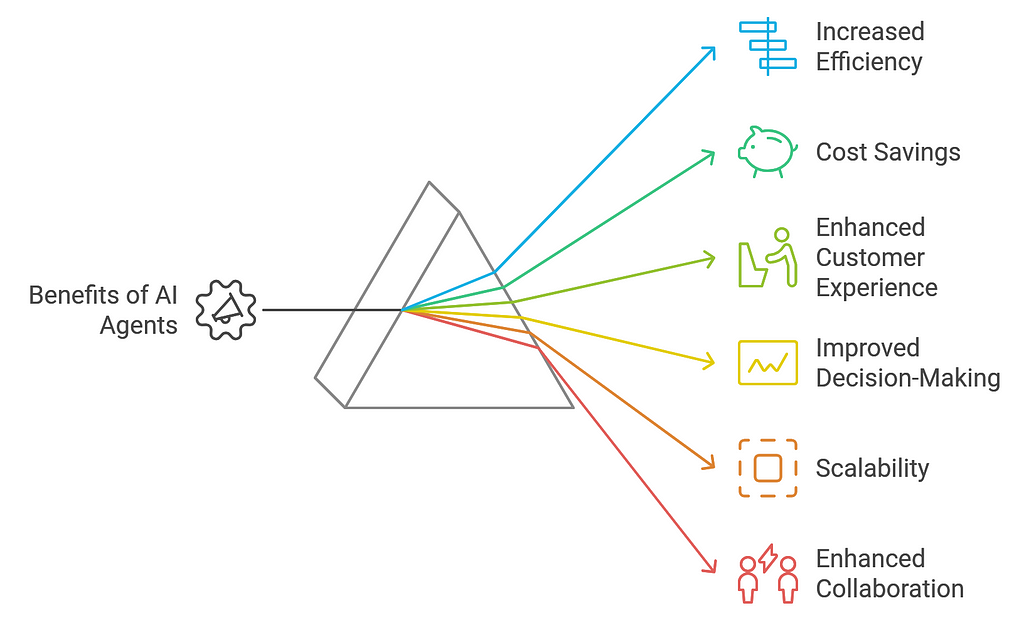 1. Increased Efficiency
1. Increased Efficiency- Task Automation: AI agents can handle repetitive tasks, such as data entry, scheduling, and customer inquiries, allowing employees to focus on higher-value work.
- Faster Processing: They can analyze large volumes of data much faster than humans, enabling quicker decision-making and response times.
- Reduced Labor Costs: Automating routine tasks can decrease the need for additional staff, leading to significant cost reductions.
- Operational Efficiency: AI agents optimize processes, reducing waste and improving resource management, which can lead to lower operational costs.
- 24/7 Availability: AI agents provide round-the-clock support, ensuring that customer inquiries are addressed anytime, improving satisfaction and loyalty.
- Personalization: They can analyze customer data to offer personalized recommendations and responses, enhancing the overall customer experience.
- Data-Driven Insights: AI agents provide real-time analytics and insights, enabling businesses to make informed decisions based on current data trends.
- Predictive Analytics: By leveraging historical data, they can predict customer behavior and market trends, helping businesses to anticipate needs and adjust strategies accordingly.
- Easier Scaling: AI agents can easily scale operations without the need for proportional increases in human resources, making it easier for businesses to expand.
- Adaptability to Demand: They can handle fluctuations in workload efficiently, adapting to peaks in customer inquiries or operational demands.
- Integration with Tools: AI agents can seamlessly integrate with various business tools and platforms, facilitating better collaboration among teams.
- Support for Human Workers: They assist employees by providing real-time information, reminders, and recommendations, enhancing productivity and teamwork.
- Self-Optimizing Algorithms: Many AI agents utilize machine learning, allowing them to continuously improve their performance based on new data and experiences.
- Feedback Loops: They can learn from user interactions, refining their responses and recommendations over time to better meet user needs.
- Anomaly Detection: AI agents can identify unusual patterns or behaviors in data, helping to detect potential fraud or operational issues early.
- Compliance Monitoring: They can assist in monitoring and ensuring adherence to industry regulations, reducing the risk of non-compliance penalties.
- Fostering Innovation: By automating routine tasks and providing insights, AI agents free up human resources for creative problem-solving and innovation.
- Staying Competitive: Businesses that adopt AI agents can gain a competitive edge by improving efficiency, enhancing customer service, and making better strategic decisions.
AI agents offer transformative benefits that can enhance operational efficiency, reduce costs, improve customer satisfaction, and drive innovation, making them a valuable asset for businesses looking to thrive in a competitive landscape.
How to Get Started with AI Agents in Your Business?Getting started with AI agents in your business involves several key steps to ensure a successful implementation that meets your needs and objectives. Here’s a comprehensive guide to help you embark on this journey:
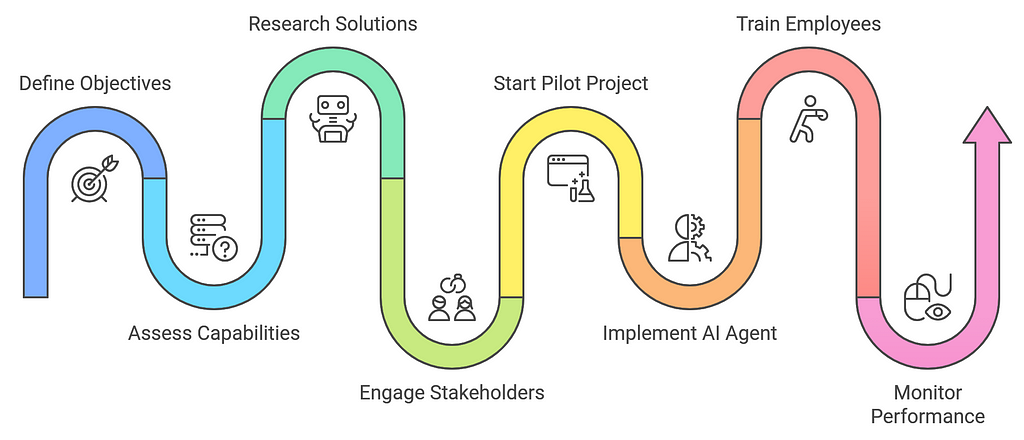 1. Define Your Objectives
1. Define Your Objectives- Identify Business Goals: Clearly articulate what you hope to achieve by implementing AI agents. This could include improving customer service, automating processes, enhancing data analysis, or driving sales.
- Specify Use Cases: Determine specific scenarios where AI agents can add value, such as customer support chatbots, virtual assistants for scheduling, or AI-driven analytics.
- Evaluate Existing Infrastructure: Review your current technology stack and systems to identify compatibility with potential AI solutions.
- Identify Data Sources: Understand what data you have and how it can be leveraged by AI agents. High-quality data is essential for effective AI performance.
- Explore Available Technologies: Research various AI agents available on the market, considering factors such as functionality, integration capabilities, and scalability.
- Vendor Comparison: Evaluate different vendors based on their reputation, support services, and case studies relevant to your industry.
- Involve Key Personnel: Engage employees and stakeholders who will interact with or benefit from AI agents. Their insights will help tailor the solution to meet real needs.
- Gain Buy-In: Communicate the benefits of AI agents to secure support from leadership and staff, emphasizing how they can enhance productivity and efficiency.
- Select a Test Case: Choose a specific use case or department for a pilot project to minimize risk and allow for manageable implementation.
- Set Clear Metrics: Define success criteria and KPIs to evaluate the performance of the AI agent during the pilot phase.
- Integration: Work with IT and the chosen vendor to ensure seamless integration of the AI agent into existing systems and processes.
- Customization: Tailor the AI agent to reflect your brand voice, adapt to business processes, and meet specific user needs.
- User Training: Provide comprehensive training for employees on how to interact with and leverage the AI agent effectively.
- Create Support Resources: Develop user manuals, FAQs, and support materials to assist employees in using the AI agent.
- Collect Data: Gather data on the AI agent’s performance against the established metrics during the pilot phase.
- User Feedback: Solicit feedback from employees and customers to understand their experiences and identify areas for improvement.
- Analyze Results: Assess the pilot project’s outcomes and gather insights on the AI agent’s effectiveness in achieving your objectives.
- Make Adjustments: Use the feedback and performance data to refine and optimize the AI agent before wider deployment.
- Expand Implementation: Once the pilot is successful, develop a plan to roll out the AI agent across other departments or use cases within the organization.
- Continuous Learning: Stay informed about advancements in AI technology and continuously explore new features or improvements that can enhance the AI agent’s capabilities.
- Regular Review: Conduct regular assessments of the AI agent’s impact on your business, including efficiency gains, cost savings, and customer satisfaction improvements.
- Adjust Strategy: Be prepared to adapt your strategy based on ongoing developments in AI technology and changes in business needs.
By following these steps, businesses can effectively integrate AI agents into their operations, leading to improved efficiency, enhanced customer interactions, and greater overall productivity. Embracing AI technology is not just about adopting new tools; it’s about transforming how your business operates to thrive in a competitive landscape.
How to Choose the Right AI Agent for Your Business?Choosing the right AI agent for your business involves a systematic approach to ensure that the selected solution aligns with your specific needs and objectives. Here are key steps to consider when making this decision:
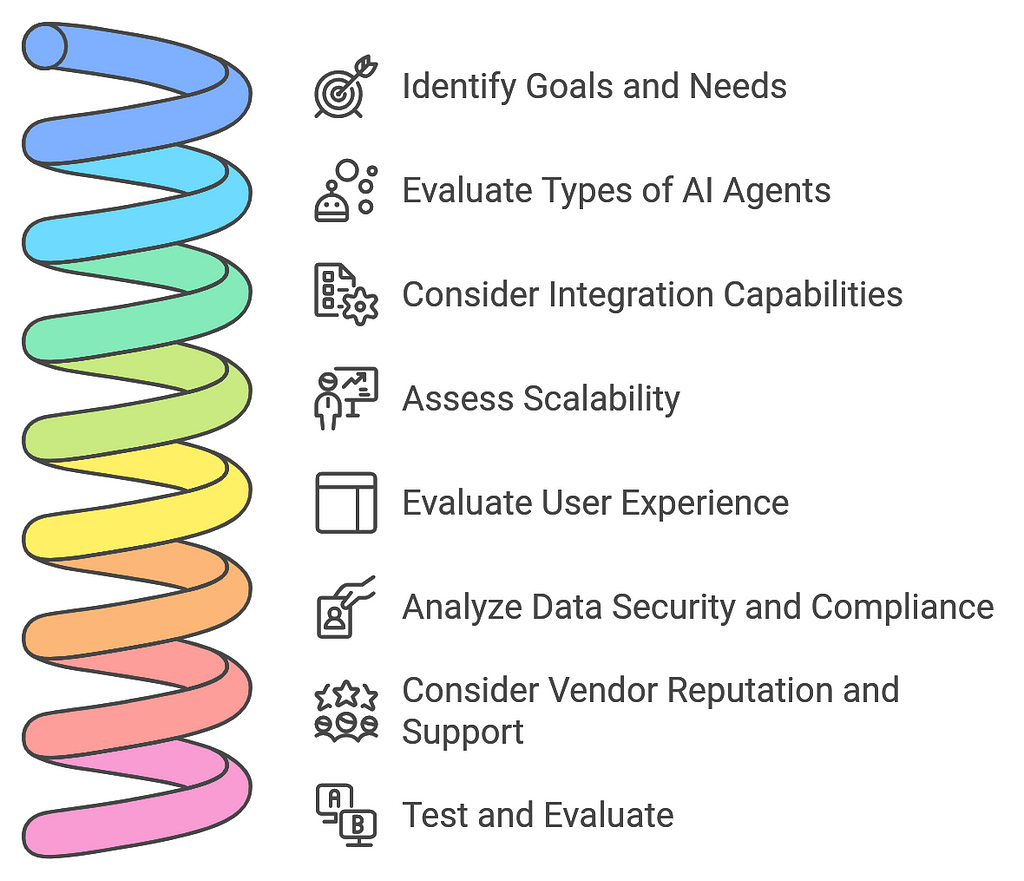 1. Identify Your Goals and Needs
1. Identify Your Goals and Needs- Define Objectives: Determine what you aim to achieve with an AI agent whether it’s improving customer service, automating tasks, enhancing decision-making, or driving sales.
- Assess Current Processes: Analyze existing workflows and identify pain points where an AI agent can add value. This will help you pinpoint the specific functions the agent needs to perform.
- Chatbots vs. Voice Assistants: Decide whether you need a text-based chatbot for customer service or a voice assistant for handling calls or in-person interactions.
- Task-Specific vs. General Agents: Consider whether you require a specialized agent for a specific task (e.g., scheduling or data analysis) or a more general-purpose AI that can handle multiple functions.
- Compatibility with Existing Systems: Ensure that the AI agent can integrate smoothly with your current software and platforms (e.g., CRM, ERP, or communication tools).
- APIs and Plugins: Look for agents that offer robust APIs and plugins to facilitate integration and enhance functionality.
- Future Growth: Choose an AI agent that can scale with your business as it grows. It should handle increased workloads and new functionalities without requiring a complete overhaul.
- Flexibility: Ensure the agent can adapt to evolving business needs and incorporate new features as they become available.
- Ease of Use: Look for an AI agent with a user-friendly interface that requires minimal training for employees and customers.
- Customization Options: Check if the agent can be tailored to fit your brand’s voice and customer experience requirements.
- Data Protection Measures: Ensure that the AI agent complies with relevant data privacy regulations (e.g., GDPR, HIPAA) and employs strong security protocols to protect sensitive information.
- Transparency: The provider should offer clear information on how data is handled, stored, and used.
- Vendor Track Record: Research potential vendors to understand their experience, reliability, and success stories within your industry.
- Customer Support: Ensure the vendor provides robust customer support and training resources to help your team utilize the AI agent effectively.
- Pilot Programs: Conduct pilot tests with the AI agent to evaluate its performance in real-world scenarios. Gather feedback from users to assess usability and effectiveness.
- Performance Metrics: Establish key performance indicators (KPIs) to measure the agent’s impact on your business objectives (e.g., response times, customer satisfaction, efficiency gains).
- Cost vs. Value: Compare the total cost of ownership (including implementation, maintenance, and potential scaling costs) against the expected value and ROI from the AI agent.
- Subscription vs. One-Time Fees: Understand the pricing model, whether it’s a subscription-based service or a one-time purchase, and assess how it fits your budget.
- Feedback Mechanisms: Set up processes to gather feedback from users and customers regularly to identify areas for improvement.
- Updates and Maintenance: Choose a vendor that offers regular updates and improvements to the AI agent to keep it relevant and effective over time.
By following these steps, businesses can effectively choose the right AI agent that aligns with their strategic goals, enhances operational efficiency, and improves overall customer satisfaction.
Key Trends in AI Agents for 2025As businesses continue to adopt AI technology, several key trends are emerging for AI agents in 2025. These trends reflect advancements in technology, changes in consumer expectations, and the evolving needs of businesses. Here are some of the most significant trends to watch:
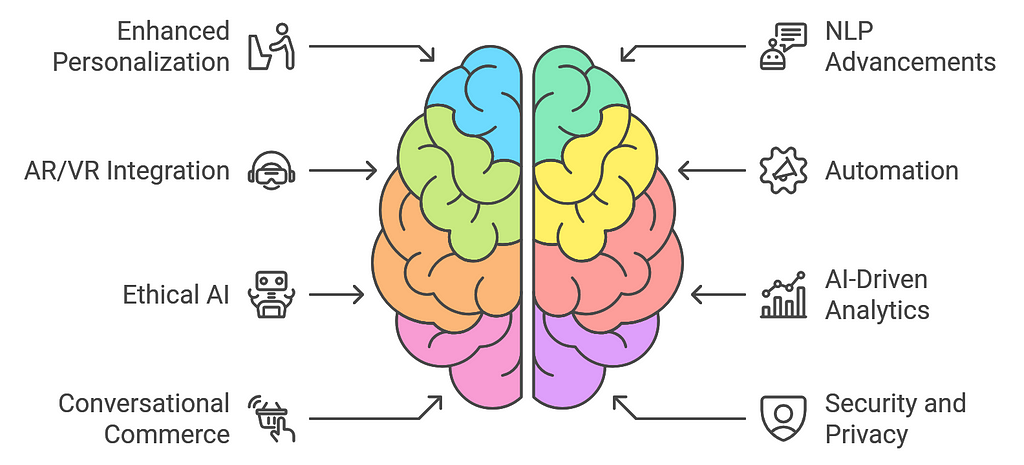 1. Enhanced Personalization
1. Enhanced Personalization- Contextual Awareness: AI agents will become more adept at understanding user context, preferences, and behaviors, allowing for hyper-personalized interactions and recommendations.
- Dynamic Learning: Continuous learning capabilities will enable AI agents to adapt their responses and suggestions based on real-time user data and feedback.
- Conversational AI: Improved NLP will lead to more human-like interactions, with AI agents understanding nuances in language, tone, and emotion.
- Multilingual Support: AI agents will increasingly support multiple languages and dialects, making them more accessible to diverse global audiences.
- Immersive Experiences: AI agents will be integrated into AR/VR environments, enhancing user experiences in fields such as retail, training, and remote collaboration.
- Virtual Assistants: Businesses will deploy AI agents in virtual environments to provide real-time assistance and information to users.
- End-to-End Automation: AI agents will automate more complex workflows, from initial customer interactions to backend processes, reducing the need for human intervention.
- Integration Across Platforms: AI agents will seamlessly connect with various business applications (CRM, ERP, etc.), creating a unified workflow and enhancing productivity.
- Responsible AI Development: Businesses will prioritize the ethical use of AI, focusing on transparency in data usage and decision-making processes.
- Bias Mitigation: Efforts to reduce bias in AI algorithms will become more prevalent, ensuring fair and equitable outcomes in AI interactions.
- Predictive Insights: AI agents will offer advanced analytics capabilities, providing businesses with predictive insights based on data trends, enabling proactive decision-making.
- Real-Time Data Processing: AI will facilitate real-time analysis of large data sets, allowing businesses to react quickly to changing market conditions.
- Shopping via Chat: AI agents will increasingly facilitate transactions through chat interfaces, allowing users to make purchases, schedule services, or receive recommendations via conversational interactions.
- Social Media Integration: Businesses will leverage AI agents on social media platforms to enhance customer engagement and drive sales through direct messaging.
- Data Protection Measures: With growing concerns about data privacy, AI agents will implement robust security protocols to protect user data and ensure compliance with regulations.
- User-Controlled Data: AI solutions will empower users to manage their data preferences, enhancing trust and encouraging greater engagement.
- Co-Working Models: AI agents will work alongside human employees, enhancing productivity by handling routine tasks and providing data-driven insights, while humans focus on strategic initiatives.
- Augmented Decision-Making: AI will assist in complex decision-making processes by providing relevant information and analysis, but humans will retain final decision authority.
- Sector Diversification: AI agents will find applications in non-traditional industries such as agriculture, construction, and environmental management, driving innovation and efficiency in these sectors.
- Customization for Industry Needs: AI solutions will be tailored to meet the unique challenges and requirements of various industries, enhancing their effectiveness.
As we approach 2025, these trends highlight the transformative potential of AI agents in shaping the future of business operations, customer interactions, and decision-making processes. Embracing these trends will be crucial for organizations looking to leverage AI effectively and stay competitive in an increasingly digital landscape.
Key Applications of AI Agents Across IndustriesAI agents are being utilized across various industries, offering tailored solutions that enhance efficiency, improve decision-making, and provide better customer experiences. Here are some key applications of AI agents across different sectors:
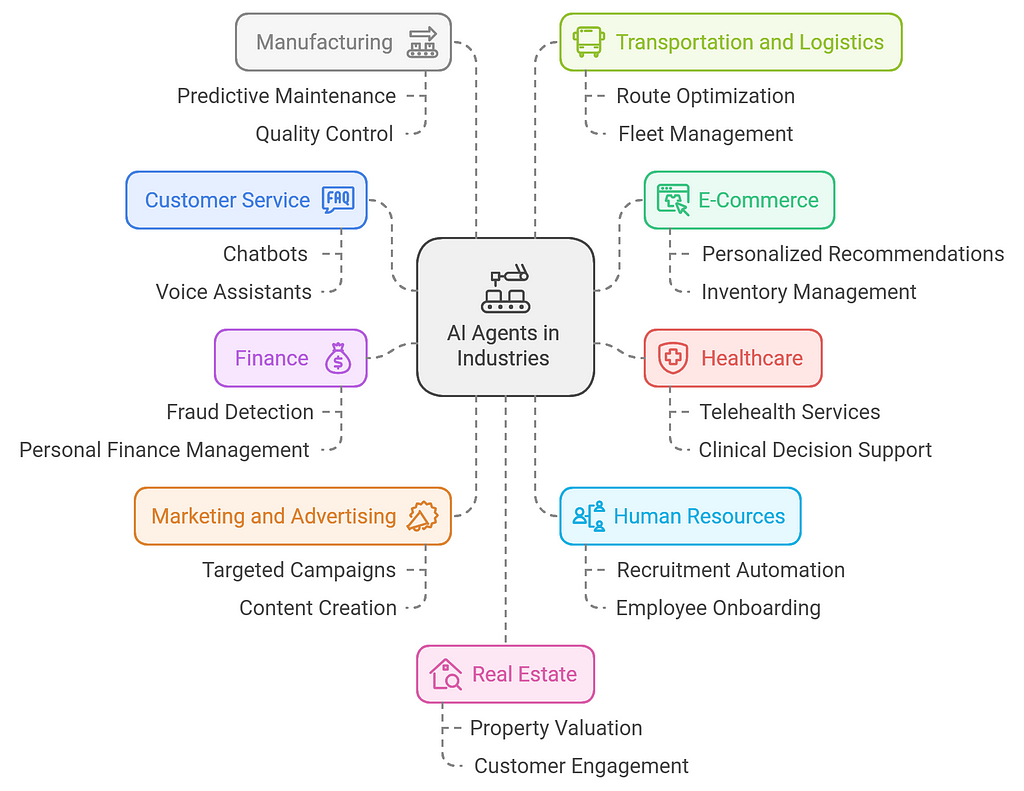 1. Customer Service
1. Customer Service- Chatbots: AI agents serve as virtual assistants on websites, handling customer inquiries, providing instant responses, and assisting with troubleshooting 24/7.
- Voice Assistants: In call centers, AI agents can manage routine calls, escalate complex issues to human agents, and analyze call data for improvements.
- Personalized Recommendations: AI agents analyze customer behavior and preferences to provide personalized product suggestions, enhancing the shopping experience.
- Inventory Management: They forecast demand and manage stock levels, optimizing inventory turnover and reducing costs.
- Telehealth Services: AI agents facilitate remote patient consultations, triaging symptoms, and scheduling appointments, improving access to healthcare.
- Clinical Decision Support: They assist healthcare providers by analyzing patient data and offering evidence-based treatment recommendations.
- Fraud Detection: AI agents monitor transactions in real time, identifying and flagging suspicious activities to prevent fraud.
- Personal Finance Management: They provide users with budgeting tools, financial advice, and insights into spending habits through mobile apps.
- Targeted Campaigns: AI agents analyze consumer data to create personalized marketing messages and target audiences effectively, improving ROI on advertising spend.
- Content Creation: They assist in generating content ideas, optimizing ad copy, and managing social media interactions.
- Recruitment Automation: AI agents streamline the hiring process by screening resumes, conducting initial interviews, and assessing candidate fit.
- Employee Onboarding: They facilitate training and onboarding processes, providing new hires with necessary information and resources.
- Predictive Maintenance: AI agents monitor machinery performance and predict failures before they occur, minimizing downtime and repair costs.
- Quality Control: They analyze production processes and outputs in real time to identify defects and maintain quality standards.
- Route Optimization: AI agents help logistics companies optimize delivery routes based on traffic patterns, weather conditions, and customer locations.
- Fleet Management: They monitor vehicle health, manage schedules, and optimize fuel usage, enhancing operational efficiency.
- Property Valuation: AI agents analyze market trends, property features, and comparable sales to provide accurate property valuations.
- Customer Engagement: They assist real estate agents by answering potential buyers’ questions and scheduling property viewings.
- Personalized Learning: AI agents create tailored learning experiences by assessing student performance and adapting content accordingly.
- Administrative Support: They help with scheduling, grading, and managing student records, allowing educators to focus on teaching.
- Smart Grid Management: AI agents optimize energy distribution and consumption, improving efficiency and reducing costs in energy management.
- Renewable Energy Forecasting: They analyze weather patterns and energy consumption data to predict renewable energy generation.
- In-Store Assistants: AI agents can guide customers through stores, provide product information, and manage inventory checks in real-time.
- Customer Loyalty Programs: They analyze purchasing patterns to enhance loyalty programs and offer personalized rewards.
AI agents are making significant inroads across industries, enabling businesses to enhance operational efficiency, improve customer interactions, and drive innovation, making them invaluable assets in the modern economy.
10 Tips on ROIs After AI Agent IntegrationMeasuring the return on investment (ROI) after integrating AI agents into your business is crucial for understanding the impact of this technology on your operations. Here are ten tips to effectively assess and optimize ROI post-integration:
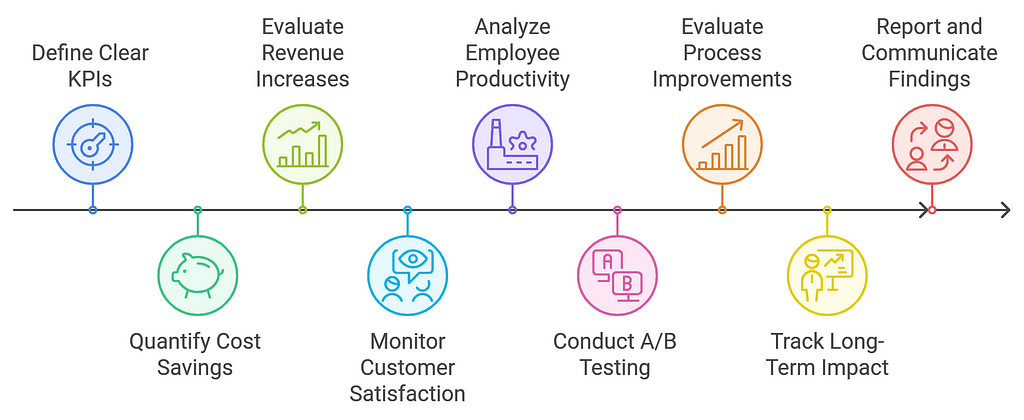 1. Define Clear KPIs
1. Define Clear KPIs- Identify Metrics: Establish specific key performance indicators (KPIs) relevant to your business goals, such as customer satisfaction scores, response times, operational efficiency, and cost savings.
- Baseline Measurements: Collect baseline data on these KPIs before AI integration to provide a point of comparison.
- Labor Cost Reduction: Calculate savings from reduced staffing needs due to automation of routine tasks.
- Efficiency Gains: Assess the time saved on processes that AI agents streamline, translating that time into cost savings.
- Sales Growth: Monitor any increase in sales attributed to improved customer interactions, upselling, or personalized recommendations driven by AI agents.
- Customer Retention: Measure the impact on customer retention rates, as better service and engagement often lead to higher loyalty and repeat business.
- Feedback and Surveys: Conduct customer satisfaction surveys and collect feedback to gauge the impact of AI agents on user experience.
- Net Promoter Score (NPS): Use NPS to measure customer loyalty and satisfaction pre- and post-AI integration.
- Time Allocation: Assess how much time employees save by using AI agents for routine tasks, allowing them to focus on higher-value activities.
- Performance Metrics: Track improvements in employee performance metrics, such as increased output or faster project completion times.
- Controlled Experiments: Implement A/B testing by comparing performance metrics from groups using AI agents against those not using them to quantify the impact on various outcomes.
- Iterate on Insights: Use insights from A/B testing to make data-driven decisions for further enhancements or adjustments.
- Operational Efficiency: Measure improvements in workflow efficiency, such as reduced bottlenecks and faster processing times, directly resulting from AI agent integration.
- Error Reduction: Analyze any decrease in errors or mistakes in processes handled by AI agents, which can lead to cost savings and enhanced quality.
- Ongoing Monitoring: Continuously track the impact of AI agents over time to understand long-term benefits and identify trends in ROI.
- Adapt Strategies: Be ready to adapt business strategies based on performance data and emerging opportunities for further AI utilization.
- Stakeholder Communication: Regularly report ROI findings to stakeholders and decision-makers, highlighting successes and areas for improvement.
- Visual Dashboards: Use visual dashboards to present data clearly and make it accessible for ongoing analysis and discussions.
- Market Conditions: Consider external factors, such as market changes or economic conditions, that could impact ROI measurements and adjust analysis accordingly.
- Feedback Loops: Establish mechanisms to incorporate feedback and lessons learned into future AI agent implementations, ensuring continuous improvement and relevance.
By following these tips, businesses can effectively measure and optimize the ROI of their AI agent integration, ensuring that the technology delivers tangible benefits and supports long-term growth and efficiency. Regular assessments and adjustments will help businesses maximize their investment in AI while adapting to evolving market demands.
Challenges and Limitations of AI AgentsDespite their many advantages, AI agents face several challenges and limitations that businesses must consider. One major issue is the complexity of integrating AI agents into existing systems, which can require significant time and resources. Additionally, AI agents often struggle with understanding nuanced human language, leading to misinterpretations and suboptimal interactions, particularly in customer service scenarios. Data privacy and security are also critical concerns, as AI agents rely on vast amounts of data, raising questions about compliance and the ethical use of information.
Furthermore, there is the risk of over-reliance on AI, where businesses might neglect the human touch essential for building strong customer relationships. Lastly, the rapid pace of AI development can make it challenging for organizations to keep their agents updated and relevant, as new technologies and best practices emerge. Addressing these challenges is crucial for businesses to fully harness the potential of AI agents while mitigating risks.
ConclusionAs we step into 2025, AI agents are set to become an indispensable asset for businesses seeking to stay competitive and drive efficiency. With their ability to automate tasks, provide insights, and personalize customer interactions, AI agents empower businesses to operate smarter and faster. From customer service bots to advanced data analysis assistants, these digital tools offer practical solutions for real-world challenges. By understanding the different types of AI agents, implementing best practices, and staying updated on emerging trends, businesses can fully leverage AI to enhance productivity and customer satisfaction. Embracing AI agents isn’t just about adopting new technology; it’s about evolving toward a more adaptive, responsive, and data-driven business model. As you explore AI possibilities, remember that the right strategy can position your business for sustainable growth and long-term success in this ever-evolving digital landscape.
An Ultimate Guide to AI Agents for Businesses in 2025 was originally published in Coinmonks on Medium, where people are continuing the conversation by highlighting and responding to this story.
